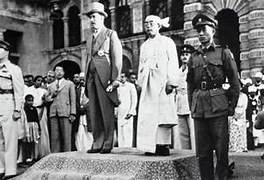On October 17, 1947, Burma achieved independence from British colonial rule, marking a significant milestone in the nation's history. The event represented the culmination of years of struggle and resistance against foreign domination, as well as the beginning of a new era for the Burmese people.
Burma, also known as Myanmar, had been under British colonial rule since the 19th century. During this time, the Burmese people experienced political and economic oppression, cultural suppression, and the exploitation of their natural resources by the British colonial administration.
However, the desire for independence and self-determination grew among the Burmese people, leading to a series of protests, strikes, and uprisings against British rule. The struggle for independence was led by influential figures such as Aung San, who became a prominent leader and advocate for Burmese independence.
After years of resistance and negotiations, the British government finally granted Burma the right to self-governance. On January 4, 1948, Burma officially became an independent nation, marking the end of more than a century of colonial rule.
The achievement of independence on October 17, 1947, was a momentous occasion for the Burmese people. It symbolized the restoration of their sovereignty, the right to govern themselves, and the opportunity to shape their own destiny. The event sparked celebrations across the country, as people rejoiced in their newfound freedom and the promise of a brighter future.
However, the road to independence was not without challenges. The new nation faced numerous hurdles, including ethnic divisions, economic instability, and political struggles. The process of nation-building and establishing a democratic government proved to be complex and arduous.
Furthermore, Burma's independence was followed by a period of political turbulence and military coup d'états that would shape the country's trajectory for decades to come. The struggle for democracy and the pursuit of stability and development have remained ongoing challenges for the Burmese people.
Despite these challenges, the achievement of independence on October 17, 1947, remains a significant moment in Burma's history. It marked the beginning of a new chapter in the nation's journey, one characterized by the pursuit of self-governance, cultural preservation, and the aspirations of its diverse population.
Burma's independence also had broader implications beyond its borders. It served as an inspiration for other colonized nations in Southeast Asia, fueling the spirit of nationalism and the desire for self-rule. The success of Burma's struggle for independence helped to pave the way for the liberation movements and the eventual decolonization of other nations in the region.
Today, the anniversary of Burma's independence on October 17, 1947, is commemorated as a national holiday. It is a time for reflection on the struggles and sacrifices made by the Burmese people in their pursuit of freedom, as well as a reminder of the ongoing challenges they face in their quest for democracy, peace, and prosperity.






